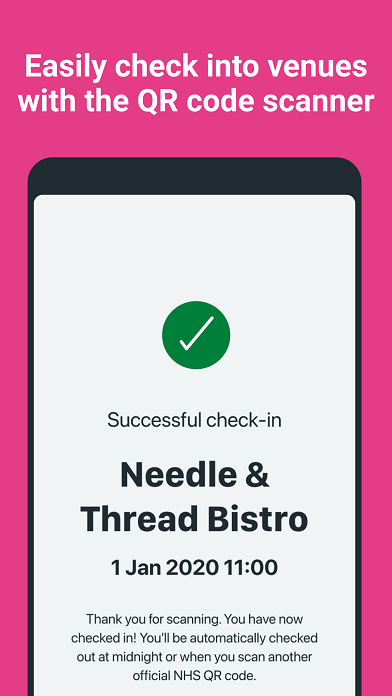
Just in a little while, Jakartans will be able to let out a sigh of relief while being out and about in public spaces. Governor's Decree No. 987 of 2021 has stated those who have at least received the first dose of the Covid-19 vaccine are allowed to visit public places by showing their digital vaccination status at JAKI. In addition to that, Jakarta through JAKI is currently developing a check-in and check-out system to provide even safer public places for the people. However, did you know the check-in system has already been implemented in other countries such as Singapore, New Zealand, England, and Ireland? How do the check-in systems work in these countries? Read along.
England and Wales: NHS COVID-19


In England and Wales, the NHS COVID-19 application allows users to check-in by scanning certain QR Codes when they enter restaurants, cinemas, places of worship and other public areas. NHS COVID-19, which was launched in September 2020, is at least routinely used by 16.5 million people (based on May 2021 data). According to a scientific article The epidemiological impact of the NHS COVID-19 app published in Nature, for every 1% increase in app uptake, is estimated to avert the number of cases by around 0.8% (using modeling) or 2.3% (using statistical analysis).
The check-in system is carried out by the user by scanning the QR Code and then the application will record the locations that have been visited by the user. If a positive case is found around the area, NHS COVID-19 app will send a notification and instruct the user to quarantine if they’ve been in close contact with someone with confirmed Covid-19. Besides the check-in feature, the NHS COVID-19 application could also be used to help order a test if needed. If someone has tested positive, the app will send a notification to people who’ve been in contact with the positive person, of course while keeping the person’s identity confidential.
Through this system, the UK Government is able to utilize the collected information to assess the level of risk based on the aggregate number of reported cases of coronavirus in one place, at a time. This information will help relevant parties update the list of locations that are at risk so the government would be able to issue relevant policies to curb the virus from spreading.
New Zealand: NZ COVID Tracer


NZ COVID Tracer is an application released by the New Zealand Ministry of Health that functions as a digital diary for its users to document the locations visited, time of visit, and people who went with them. This app helps to provide quickly accessible information that’d make it easier to track any active cases in a certain area. The tracking then will be used to notify people who’ve been in that area so they can perform preventive measures.
The New Zealand government requires business, office and public transportation owners to provide NZ COVID Tracer posters so visitors can check-in to the area by scanning a QR Code with their smartphone. In collaboration with the Privacy Commissioner and independent security experts, the New Zealand Ministry of Health ensures the privacy and security of user data.
Singapore: SafeEntry

SafeEntry Gateway Box is used by visitors with the TraceTogether app or token.
Source: todayonline
Singapore’s SafeEntry is mandatory for businesses that are starting to reopen their business activities during the Covid-19 pandemic. The device must be available in public spaces with a capacity of more than 100 people such as public libraries, hospitals, places of worship, and so on. With SafeEntry, visitor’s data will be verified with government data to facilitate the contact tracing process should the need arise. The check-in and check-out system is carried out by tapping the screen on the TraceTogether application or tapping the TraceTogether token in the SafeEntry Gateway Box provided at the entrance and exit points.
Ireland: Digital COVID Certificate Checker

While the aforementioned countries required a check-in system, Ireland is a wee bit different. In Ireland, they provide Digital COVID Certificates for people who:
have been vaccinated against COVID-19
have received a negative COVID-19 test result
have recovered from COVID-19 in the last 6 months
The COVID Digital certificate will be used as a requirement if someone wants to do activities such as indoor dining in the Irish region. This certificate (either digital or printed) will be checked using the Digital COVID Certificate Checker by scanning the certificate.

If the scan result of the certificate is valid as shown above, it means someone is allowed to do indoor dining in Ireland and is allowed for EU travel.

However, if the result given is invalid, it means the certificate can’t be used as a “ticket” for indoor dining, but still valid to use if one wants to travel to Europe.
Indonesia: Safe Entrance by PeduliLindungi
At present, the Jakarta Provincial Government and PeduliLindungi are also developing a check-in system called Safe Entrance that will serve as a prerequisite for people who want to access public places. As stipulated in the Governor’s Decree, citizens who are allowed to be in public areas must at least have received the first shot of the Covid-19 vaccine. So, if you happen to be the one who hasn't been vaccinated yet, please book a schedule for your vaccination via JAKI. Get the app on the App Store or Play Store and let's make Jakarta a pleasant place again!
 112
112
 0813 8837 6955
0813 8837 6955
 112
112
 0813 8837 6955
0813 8837 6955
 112
112
 0813 8837 6955
0813 8837 6955